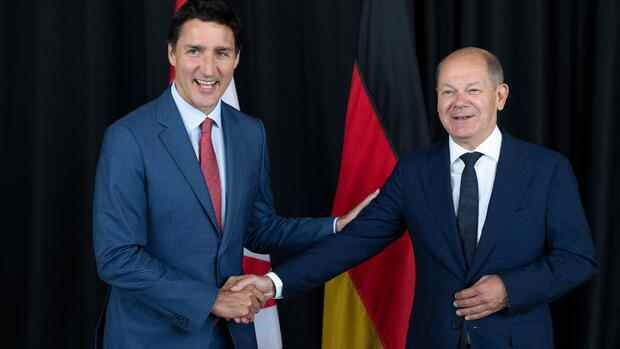The Canadian Prime Minister and the Chancellor on Monday in Montréal.
(Photo: IMAGO/ZUMA Press)
Montreal, Toronto The pictures that Olaf Scholz and Justin Trudeau send to Moscow should leave no doubt. Even the setting of the joint appearance of the Federal Chancellor and Prime Minister shows that they want to convey strength. The two are standing on a gallery outside on Monday morning, with the Montréal skyline building up behind them. It is no coincidence that Scholz not only brought his vice Robert Habeck with him, but also visited Canada for three days from Sunday to Tuesday. The chancellor’s inaugural visit hasn’t been that long.
It’s muggy that day in eastern Canada, but Scholz and Trudeau never tire of swearing by their unity. Canada and Germany are close together, Scholz makes clear. Trudeau replies, calling himself and his counterpart “progressive leaders.” The peak of unity is reached when Trudeau turns to Scholz and says: “The world needs more progressive leaders like you.”
The message is clear: despite all the challenges posed by Russia’s war of aggression in Ukraine, the shift in geopolitical power axes and the consequences for Germany’s energy supply, Wersten will not be divided. Especially Canada and Germany. This is not only a message to Russia, but also to our own ranks.
The global West is relatively stable, but the first cracks in solidarity are beginning to appear. In Brussels there had been discussions about the savings plan for gas because some member states did not want to iron out Germany’s mistakes. At the same time, there is growing concern that in a few years the US President could once again be called Donald Trump.
Top jobs of the day
Find the best jobs now and
be notified by email.
Scholz and Trudeau want to form the counterpart. They are trying to demonstrate that the crisis is really bringing them together. That they bring the same compass of values, are politically stable and pursue the same goals: domestically the green transformation of the economy, foreign policy rebellion against Russia. In these difficult times, the two heads of government present themselves as the new trendsetters of the global West.
The heads of state of Canada and Germany emphasize the common values.
(Photo: IMAGO/ZUMA Press)
This applies not only politically, but also economically. Germany has the economic strength, Canada the raw material resources and areas for renewable energies. Both want to benefit from each other. “The country has similar rich mineral resources as Russia – with the difference that it is a reliable democracy,” Scholz said on Sunday evening after arriving in Montréal.
The Chancellor has brought a prominent business delegation with him. VW boss Herbert Diess and Mercedes board member Markus Schäfer want to sign agreements with the Canadian side on Tuesday, as Scholz announced. In particular, it should be about raw materials for electric car batteries.
Punctuation towards the Kremlin
“The solidarity with Canada has existed for a long time, but it was hardly visible,” says another managing director who traveled with him, while Scholz visited the “Montréal Institute of Learning Algorithms” with the delegation on Monday afternoon. Business also sees further potential in the partnership between the two countries when it comes to innovation. The trip finally makes the close partnership visible, the company boss continues: “This is an important sign towards Russia and in general.”
Ultimately, it is also a sign in the direction of the Kremlin. At their joint appearance, Scholz and Trudeau made it clear that they want to support Ukraine for a long time and withstand Russian provocation.
You don’t even let yourself be divided when Russia tries to push a heavy turbine between them. It’s about the turbine for the Nord Stream 1 pipeline. Moscow is using this as an excuse, the West agrees, to cut gas supplies and put Germany under pressure. The turbine, built by German concern Siemens Energy, was in Canada for maintenance and could not be returned due to sanctions there.
In order to take away the pretext for Vladimir Putin, Trudeau and his vizin Chrystia Freeland allowed themselves to be persuaded to send the turbine back anyway. “That was an important decision. Because it exposed Putin’s strategy aimed at dividing allies, aimed at undermining support for Ukraine,” Scholz said in front of Trudeau. Siemens Energy CEO Christian Bruch is also part of the business delegation.
Especially for Freeland it was not an easy action. She has Ukrainian roots. The Ukrainians had influenced them, they wanted to prevent the return delivery. It would be fine with them if German-Russian energy relations were severed sooner.
However, the role of the Scholz-Trudeau tandem as a pioneer for the western world represents a bold goal. Canada and Germany alone do not have the same economic strength compared to the great powers China and the USA. Germany’s gross domestic product is the fourth largest in the world, Canada is ninth. They will probably not be able to hold the global West together alone. However, they may at least be able to set the pace.
More: The visit of the chancellor and vice chancellor to the second largest country in the world is not only about natural resources, but also about an alliance of democratic states.
